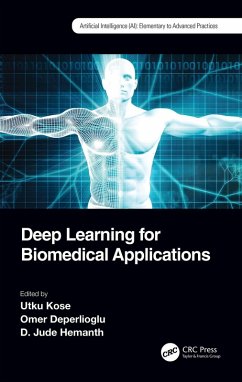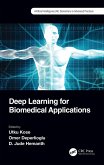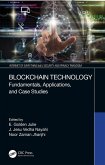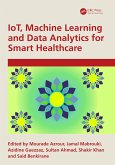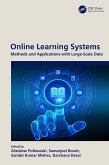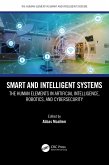Deep Learning for Biomedical Applications (eBook, ePUB)
Redaktion: Kose, Utku; Hemanth, D. Jude; Deperlioglu, Omer
48,95 €
48,95 €
inkl. MwSt.
Sofort per Download lieferbar

24 °P sammeln
48,95 €
Als Download kaufen

48,95 €
inkl. MwSt.
Sofort per Download lieferbar

24 °P sammeln
Jetzt verschenken
Alle Infos zum eBook verschenken
48,95 €
inkl. MwSt.
Sofort per Download lieferbar
Alle Infos zum eBook verschenken

24 °P sammeln
Deep Learning for Biomedical Applications (eBook, ePUB)
Redaktion: Kose, Utku; Hemanth, D. Jude; Deperlioglu, Omer
- Format: ePub
- Merkliste
- Auf die Merkliste
- Bewerten Bewerten
- Teilen
- Produkt teilen
- Produkterinnerung
- Produkterinnerung

Bitte loggen Sie sich zunächst in Ihr Kundenkonto ein oder registrieren Sie sich bei
bücher.de, um das eBook-Abo tolino select nutzen zu können.
Hier können Sie sich einloggen
Hier können Sie sich einloggen
Sie sind bereits eingeloggt. Klicken Sie auf 2. tolino select Abo, um fortzufahren.

Bitte loggen Sie sich zunächst in Ihr Kundenkonto ein oder registrieren Sie sich bei bücher.de, um das eBook-Abo tolino select nutzen zu können.
This book is a detailed reference on biomedical applications using Deep Learning. Because Deep Learning is an important actor shaping the future of Artificial Intelligence, its specific and innovative solutions for both medical and biomedical are very critical. This book starts with essentials and moves toward deeper and advanced topics.
- Geräte: eReader
- ohne Kopierschutz
- eBook Hilfe
- Größe: 17.04MB
Andere Kunden interessierten sich auch für
![Deep Learning for Biomedical Applications (eBook, PDF) Deep Learning for Biomedical Applications (eBook, PDF)]() Deep Learning for Biomedical Applications (eBook, PDF)48,95 €
Deep Learning for Biomedical Applications (eBook, PDF)48,95 €![Additive Manufacturing of Polymers for Tissue Engineering (eBook, ePUB) Additive Manufacturing of Polymers for Tissue Engineering (eBook, ePUB)]() Additive Manufacturing of Polymers for Tissue Engineering (eBook, ePUB)47,95 €
Additive Manufacturing of Polymers for Tissue Engineering (eBook, ePUB)47,95 €![Cyber-Physical Systems for Industrial Transformation (eBook, ePUB) Cyber-Physical Systems for Industrial Transformation (eBook, ePUB)]() Cyber-Physical Systems for Industrial Transformation (eBook, ePUB)47,95 €
Cyber-Physical Systems for Industrial Transformation (eBook, ePUB)47,95 €![Blockchain Technology (eBook, ePUB) Blockchain Technology (eBook, ePUB)]() Blockchain Technology (eBook, ePUB)48,95 €
Blockchain Technology (eBook, ePUB)48,95 €![IoT, Machine Learning and Data Analytics for Smart Healthcare (eBook, ePUB) IoT, Machine Learning and Data Analytics for Smart Healthcare (eBook, ePUB)]() IoT, Machine Learning and Data Analytics for Smart Healthcare (eBook, ePUB)51,95 €
IoT, Machine Learning and Data Analytics for Smart Healthcare (eBook, ePUB)51,95 €![Online Learning Systems (eBook, ePUB) Online Learning Systems (eBook, ePUB)]() Online Learning Systems (eBook, ePUB)48,95 €
Online Learning Systems (eBook, ePUB)48,95 €![Smart and Intelligent Systems (eBook, ePUB) Smart and Intelligent Systems (eBook, ePUB)]() Smart and Intelligent Systems (eBook, ePUB)47,95 €
Smart and Intelligent Systems (eBook, ePUB)47,95 €-
-
-
This book is a detailed reference on biomedical applications using Deep Learning. Because Deep Learning is an important actor shaping the future of Artificial Intelligence, its specific and innovative solutions for both medical and biomedical are very critical. This book starts with essentials and moves toward deeper and advanced topics.
Dieser Download kann aus rechtlichen Gründen nur mit Rechnungsadresse in A, B, BG, CY, CZ, D, DK, EW, E, FIN, F, GR, HR, H, IRL, I, LT, L, LR, M, NL, PL, P, R, S, SLO, SK ausgeliefert werden.
Produktdetails
- Produktdetails
- Verlag: Taylor & Francis
- Seitenzahl: 364
- Erscheinungstermin: 19. Juli 2021
- Englisch
- ISBN-13: 9781000406436
- Artikelnr.: 62002555
- Verlag: Taylor & Francis
- Seitenzahl: 364
- Erscheinungstermin: 19. Juli 2021
- Englisch
- ISBN-13: 9781000406436
- Artikelnr.: 62002555
- Herstellerkennzeichnung Die Herstellerinformationen sind derzeit nicht verfügbar.
Utku Kose received the B.S. degree in 2008 from computer education of Gazi University, Turkey as a faculty valedictorian. He received M.S. degree in 2010 from Afyon Kocatepe University, Turkey in the field of computer and D.S. / Ph. D. degree in 2017 from Selcuk University, Turkey in the field of computer engineering. Between 2009 and 2011, he has worked as a Research Assistant in Afyon Kocatepe University. Following, he has also worked as a Lecturer and Vocational School - Vice Director in Afyon Kocatepe University between 2011 and 2012, as a Lecturer and Research Center Director in Usak University between 2012 and 2017, and as an Assistant Professor in Suleyman Demirel University between 2017 and 2019. Currently, he is an Associate Professor in Suleyman Demirel University, Turkey. He has more than 100 publications including articles, authored and edited books, proceedings, and reports. He is also in editorial boards of many scientific journals and serves as one of the editors of the Biomedical and Robotics Healthcare book series by CRC Press. His research interest includes artificial intelligence, machine ethics, artificial intelligence safety, optimization, the chaos theory, distance education, e-learning, computer education, and computer science. Omer Deperlioglu has received his ph.D. degree from Gazi University, Department of Computer Science, Ankara, Turkey in 2001. He has joined at the Department of Computer Science, Afyon Kocatepe University as an associate professor since 2012. He served as the head of department. His current research interests include Artificial Intelligence applications, signal processing and image processing in Biomedical engineering. He has published 10 books, 40 articles and more than 50 papers. Attended more than 40 conferences. He was a member of the International Technical Committee in 6 conferences and workshops. He is serving as an editorial board member of several international journals including an Associate Editors of IET The Journal of Engineering. He is also a Book Series Editor - Biomedical and Robotics Healthcare (CRC Press). D. Jude Hemanth received his B.E degree in ECE from Bharathiar University in 2002, M.E degree in communication systems from Anna University in 2006 and Ph.D. from Karunya University in 2013. His research areas include Computational Intelligence and Image processing. He has authored more than 130 research papers in reputed SCIE indexed International Journals and Scopus indexed International Conferences. His Cumulative Impact Factor is more than 180. He has published 33 edited books with reputed publishers such as Elsevier, Springer and IET. He has been serving as Associate Editor/Scientific Editor of SCIE Indexed International Journals such as Journal of Intelligent and fuzzy systems, Mathematical Problems in Engineering. IET Qunatum Communications and Dyna (Spain). He serves as an Editorial Board member/Guest Editor of many journals with leading publishers such as Elsevier (Soft Computing Letters), Springer (Multidimensional Systems and Signal Processing, SN Computer Science, Sensing and Imaging) and Inderscience (IJAIP, IJICT, IJCVR, IJBET). He is the series editor of "Biomedical Engineering" book series in Elsevier and "Robotics & Healthcare" book series with CRC Press. He has received a project grant with 35,000 UK Pound from Government of UK (GCRF scheme) with collaborators from University of Westminster, UK. He has also completed 1 funded research project from CSIR, Govt. of India and 1 ongoing funded project from DST, Govt. of India. He also serves as the "Research Scientist" of Computational Intelligence and Information Systems (CI2S) Lab, Argentina; LAPISCO research lab, Brazil; RIADI Lab; Tunisia and Research Centre for Applied Intelligence, University of Craiova, Romania He has been also the organizing committee member of several international conferences across the globe such as Portugal, Romania, UK, Egypt, China, etc. He has delivered more than 100 Keynote talks/Invited Lectures in International Conferences/workshops. He holds professional membership with IEEE Technical Committee on Neural Networks (IEEE Computational Intelligence Society) and IEEE Technical Committee on Soft Computing (IEEE Systems, Man and Cybernatics Society).
1. Disease Diagnosis with Deep Learning. 2. Medical Image Analysis with
Deep Learning. 3. Medical Image Registration with Deep Learning. 4. Medical
Data Synthesis with Deep Learning. 5. Genomics with Deep Learning. 6.
Patient Care and Treatment with Deep Learning. 7. Hybrid Intelligent Deep
Learning Oriented Systems for Biomedical. 8. Deep Learning Oriented
Robotics for Biomedical. 9. Deep Learning Based Autonomous Biomedical
Solutions. 10. Specific Use of Deep Learning Techniques (CNN, LSTM...etc.)
for Biomedical. 11. Compare of Deep Learning with Traditional Solutions for
Biomedical.
Deep Learning. 3. Medical Image Registration with Deep Learning. 4. Medical
Data Synthesis with Deep Learning. 5. Genomics with Deep Learning. 6.
Patient Care and Treatment with Deep Learning. 7. Hybrid Intelligent Deep
Learning Oriented Systems for Biomedical. 8. Deep Learning Oriented
Robotics for Biomedical. 9. Deep Learning Based Autonomous Biomedical
Solutions. 10. Specific Use of Deep Learning Techniques (CNN, LSTM...etc.)
for Biomedical. 11. Compare of Deep Learning with Traditional Solutions for
Biomedical.
1. Disease Diagnosis with Deep Learning. 2. Medical Image Analysis with
Deep Learning. 3. Medical Image Registration with Deep Learning. 4. Medical
Data Synthesis with Deep Learning. 5. Genomics with Deep Learning. 6.
Patient Care and Treatment with Deep Learning. 7. Hybrid Intelligent Deep
Learning Oriented Systems for Biomedical. 8. Deep Learning Oriented
Robotics for Biomedical. 9. Deep Learning Based Autonomous Biomedical
Solutions. 10. Specific Use of Deep Learning Techniques (CNN, LSTM...etc.)
for Biomedical. 11. Compare of Deep Learning with Traditional Solutions for
Biomedical.
Deep Learning. 3. Medical Image Registration with Deep Learning. 4. Medical
Data Synthesis with Deep Learning. 5. Genomics with Deep Learning. 6.
Patient Care and Treatment with Deep Learning. 7. Hybrid Intelligent Deep
Learning Oriented Systems for Biomedical. 8. Deep Learning Oriented
Robotics for Biomedical. 9. Deep Learning Based Autonomous Biomedical
Solutions. 10. Specific Use of Deep Learning Techniques (CNN, LSTM...etc.)
for Biomedical. 11. Compare of Deep Learning with Traditional Solutions for
Biomedical.
